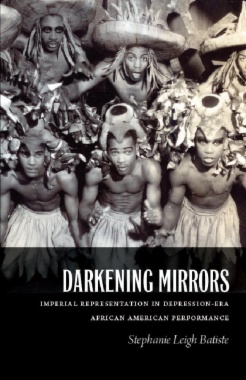In Darkening Mirrors, Stephanie Leigh Batiste examines how African Americans participated in U.S. cultural imperialism in Depression-era stage and screen performances. A population treated as second-class citizens at home imagined themselves as empowered, modern U.S. citizens and transnational actors in plays, operas, ballets, and films. Many of these productions, such as the 1938 hits Haiti and The "Swing" Mikado recruited large casts of unknown performers, involving the black community not only as spectators but also as participants. Performances of exoticism, orientalism, and primitivism are inevitably linked to issues of embodiment, including how bodies signify blackness as a cultural, racial, and global category. Whether enacting U.S. imperialism in westerns, dramas, dances, songs, jokes, or comedy sketches, African Americans maintained a national identity that registered a diasporic empowerment and resistance on the global stage. Boldly addressing the contradictions in these performances, Batiste challenges the simplistic notion that the oppressed cannot identify with oppressive modes of power and enact themselves as empowered subjects. Darkening Mirrors adds nuance and depth to the history of African American subject formation and stage and screen performance.
- Contents
- List of Figures
- Prologue
- Acknowledgments
- Introduction
- 1. “Harlem Rides the Range”, Expansion, Modernity, and Negro Success
- 2. Epaulets and Leaf Skirts, Warriors and Subversives, Performance of the Haitian Revolution
- 3. Prism of Imperial Gaze, Swinging the Negro Mikado
- 4. Lens/Body, Anthropology’s Methodologies and Spaces of Reflection in Dunham’s Diaspora
- 5. Ethnographic Refraction, Exoticism and Diasporic Sisterhood in The Devil’s Daughter
- 6. No Storm in the Weather, Domestic Bliss and African American Performance
- Epilogue
- Notes
- Bibliography
- Index

